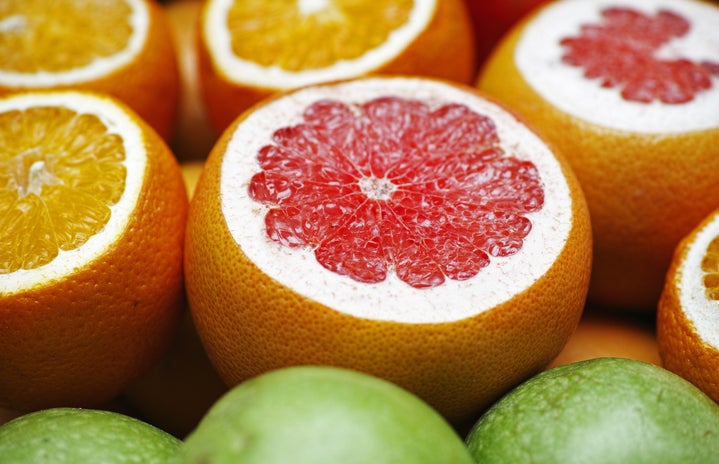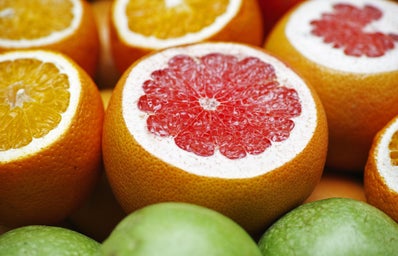This week, Her Campus Texas A&M had the pleasure of conversating with Marissa Albers, a junior nutrition major from Dallas, Texas, with a minor in horticulture.
Her Campus Texas A&M: So give us a little background as to why you chose your major.
Marissa Albers: My mom has fibromyalgia, which is basically a disease that doctors kind of say ‘We don’t know what else is wrong with you so we are going to diagnose you with fibromyalgia.’ Which means that you hurt all the time and you don’t know why. With that comes a lot of medication, so I really want to minimize the medication intake. I thought your food should be your medicine. I was also really involved in sports growing up and was really interested in what you ate, how you felt because of that, and how that affected your daily life. So there are actually multiple things that kind of influenced the nutrition background.
HC TAMU: Okay, and what exactly is it that you want to do with this major after you graduate?
Albers: I want to be a registered dietician. Anyone can be nutritionist but to be a registered dietician you have to to have a license to practice nutrition counseling. I would also like to include horticulture into that by maybe helping with food security, whether that’s locally or globally. Maybe teaching people how to have access to better food by growing it themselves.
HC TAMU: That’s awesome and I know that is done here at Howdy Farm!
Albers: Yes!
HC TAMU: So first of all, for those who don’t know what we are talking about, what is Howdy Farm?
Albers: Howdy Farm is our student run community farm on campus. We have a farm manager employed by the university. He oversees everything but it’s primarily run by students and it’s really neat because we have anyone from volunteers to members of our student organization. So we have a very broad spectrum of involvement. We have people that come our once a semester and we have people that come out every day.
HC TAMU: I have understood that Howdy Farm has a store that opens every Thursday, so how can students benefit from their produce here instead of at local grocery stores?
Albers: That is sort of a mutual beneficial relationship. They are putting their money back into their university and helping a local business as opposed to buying from the grocery store. I will say HEB does source a lot of their products locally but you never really know what you’re getting and where it’s coming from at the grocery store. From purchasing at Howdy Farm they know exactly how it was grown, where it came from, they get to meet the person that is selling to them so they get to directly see the people that it benefits by buying from there.
HC TAMU: So according to the Howdy Farm website, you are currently in charge of Public Relations. How do you play this role and how do you manage to get the word out on Howdy Farm?
Albers: Part of what I do is manage the blog for Howdy Farm and I also manage the social media accounts. This is the first semester where we have appointed committees so I do have a committee that is underneath me this semester and they help me out a lot with the blog . My job is to delegate who will write the blog post for the week and posting it and making it look nice onto the blog so formatting. As far as social media goes, we really try to push some of our events. We just had Saturday in the farm. Part of my job for that letting the community know what was happening. We do crossover, so we are not just for people at the university. We are also here as a learning resource for the community, so for that event in particular my job was to bridge the gap between students and the community knowing. I had to advertise to not only students, but to the Bryan-College Station area. I got to learn how to contact a newspaper for ads and I had an interview with the radio. It was really cool and I found a lot about how we have a community calendar in the Bryan-College Station area for everything going on in town. It’s free to add on their you just have to get your event approved!
HC TAMU: Going back to that blog, can people interact with it?
Albers: Yes, we have a comment section so you can send us private messages. It might be more effective if you just email us at thehowdyfarm@gmail.com . We typically get to those responses quicker. People can also comment on the Facebook posts if they have any questions.
HC TAMU: Okay that’s awesome! I came to Howdy Farm for the first time last week and I volunteered for six hours. I got to pick lettuce and wash it. I got to interact with some people and sell items. I certainly learned a lot in my visit. What is something you have learned?
Albers: I’ve learned so much! It’s hard to pinpoint. Something really cool that I’ve learned is how to propagate a plant. I can remember one of my favorite days at the farm. My favorite fruit is figs and we have two fig trees here! During my internship here at the beginning, we went and took clippings off of the fig tree and I was wondering ‘what are we gonna do with these?’ but it turns out I got to see how to turn one fig tree into ten. It was so cool! There was no money exchange, it was free. You just take a clipping and you learn how to do it the right way. I didn’t even know that plants could asexually propagate themselves. So that was a good learning experience. At the time, it blew my mind. Figs are so expensive at the store but you can do it yourself and feed your family!
HC TAMU: Isn’t that cool? That’s amazing. Are you planning on getting more involved in this organization?
Albers: Yes! Actually, next semester I am going to be the president of this student organization. I’ve been here since I was a freshman. This was the first thing I was involved in at Texas A&M, so I’m really excited to step up into that role.
HC TAMU: What are some things you can bring to the (literal) table?
Albers: I’ve really seen the farm evolve over the last couple of years. I think I may have been here the longest out of the people that are still left! When I joined, it was mostly juniors and seniors and they’ve all left. So I got to see it when it was in that stage of development. When I first joined we had maybe about 10-15 members and now we are up to about 70. This building didn’t exist, we met in a small classroom, it was small scale. So I can take what I have learned from past and present experiences to make a better future for Howdy Farm. Now that we have committees, I can see how it has helped or hurt and adjust from there.
HC TAMU: Interesting. Do you any ideas on how to bring Howdy Farm to students on the other side of campus? Because students who spend their time on main campus might not know about this place.
Albers: I do! I agree. There definitely is a huge gap west campus and central campus. Many students don’t even know we’re here which is why our population has been so small and I think we’ve done a pretty good job. It’s been a lot of word of mouth, so once they realize it’s here they love it and they come and hang out and they see that it’s a good thing and they spread the word. But as far as getting one step further and marketing ourselves I would like to implement Sandwich Boards on main campus so people can read while they’re walking to class, that talk about our Thursday markets! I also had an idea, because we are all about growing our own food, to have a couple of produce costumes like banana and carrot suits and have our members walk around on main campus for photo ops. People love snapchat so they can take a picture with us. Just going out there and marketing ourselves.
HC TAMU: How are you tying this entire experience back to your major or life in general?
Albers: For my life in general, I came to school knowing that I was studying nutrition and I thought ‘Well if nothing else comes out of this experience at least I can know that I have the knowledge to have a healthy family and that includes the horticulture side. I’ve learned how to have my own garden, how to feed my family with my own resources and bypass some of those procedures that plants have to go through to get to the grocery store. With my personal life, I am comforted to know I have the knowledge to provide for my family. As far as my major, I think that as far nutrition and horticulture goes, knowing where your food comes from is the first step in being healthy. Nutrients come from the soil, so it is so important. The whole farm to table movement is neat and everything but people always look past the true importance of it. I think they’re very inter-related and inner connected. It’s important to know where your food is coming from and what you’re putting in your body.
HC TAMU: And finally, how can other people get involved?
Albers: We have volunteer hours Mondays, Wednesdays and Fridays from 1-5 p.m. You can always come out to volunteer even if you have no gardening experience at all or even if you want to learn. We welcome anybody. You don’t even have to be affiliated with the university. You can also intern at the Howdy Farm! You can apply and get class credit to be working on the farm, which is always fun. You can also be member of our organization!


